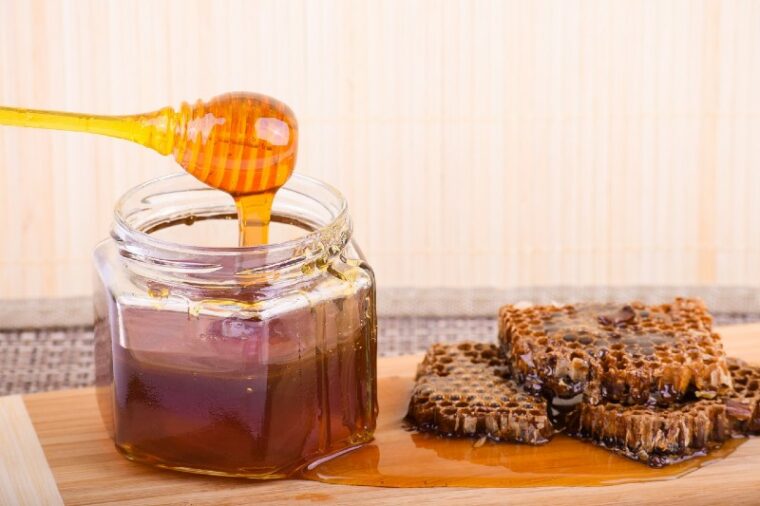
Click to Skip Ahead
Do you like to give honey to your honey? I’m talking about your dog, of course! Honey is a natural sweetener that has been consumed since ancient times and provides many nutritional benefits. While honey may be safe for human consumption, this does not necessarily mean it is safe for dogs to consume. Dogs can eat honey in moderation, but there are some risks that pet owners should consider before feeding their furry friend the sweet treat.
What Are the Benefits of Honey for Dogs?
There are some great benefits of feeding honey to dogs. Honey can help to soothe a dog’s throat and stomach and can also act as a cough suppressor. Additionally, honey contains antioxidants that can help to boost a dog’s immune system.

What Are the Risks of Honey for Dogs?
There are also a few risks associated with feeding honey to dogs. Honey may contain bacterial spores that can be harmful to puppies, and some dogs may be allergic to honey. It is important to speak with a veterinarian before giving honey to a dog, as they will be able to advise on the best way to do so safely.
Signs of Honey Allergy in Dogs
If a dog is allergic to honey, they may experience signs such as vomiting, diarrhea, and hives. If these symptoms occur after eating honey, it is important to stop feeding the treat immediately and consult with a veterinarian. Other signs of an allergic reaction in your dog include:
How Do I Start My Dog on Honey?
When feeding honey to a dog, it is important to start with small amounts and increase gradually over time. This will help the dog’s body get used to the sugar in honey and avoid any potential stomach upset. Starting small will also allow you to monitor your dog for any signs of allergies.
Can I Feed Honey to My Puppy?
Honey should never be given to puppies under the age of 12 weeks, as their digestive systems are not yet fully developed, and they may be more likely to experience an adverse reaction.

Is the Bacteria in Honey Dangerous for My Dog?
While the bacteria found in honey is generally not harmful to dogs, it can cause an upset stomach if consumed in large quantities. As such, it is best to only give small amounts of honey to your dog and consult with a veterinarian before doing so.
What Are the Nutritional Benefits of Honey?
Honey is a natural source of carbohydrates, minerals and vitamins. It also contains antioxidants which can help to boost a dog’s immune system. Additionally, honey has antimicrobial properties that can help soothe your dog’s throat and stomach.
Tips for Feeding Your Dog Honey

A Word About Feeding Sugar to Your Dog
While sugar is not toxic to dogs, it is not a healthy food choice for them and should be avoided whenever possible. are a few reasons why sugar is not a good choice for dogs.
Overall, honey can be a safe and beneficial treat for dogs if given in moderation. However, it is important to speak with a veterinarian before giving your dog any type of sweet treat, including honey, to ensure they are getting the nutrition they need without any potential risks.
The Danger of Obesity in Dogs
Obesity is a serious health issue in both humans and dogs. Dogs that are overweight or obese can suffer from a range of health issues, including joint problems, heart disease, respiratory difficulties, and diabetes.
In addition to avoiding sugary treats like honey, dog owners should ensure their pet is getting enough exercise each day and eating a balanced, nutritious diet.
It is also important to speak with a veterinarian about the best type of food for your particular dog and any potential dietary restrictions.
Feeding Dogs Honey FAQs
Can my dog eat honey if he’s allergic to bees?
No, honey should be avoided if your dog is allergic to bees. Honey could contain trace amounts of bee proteins which may trigger an allergic reaction in dogs sensitive to bee stings or bee venom.
Is there a difference between raw honey and regular honey?
Yes, raw honey has not been processed or heated, so it contains beneficial enzymes and bacteria that are destroyed during the pasteurization process. However, raw honey can also contain botulism spores which can be toxic to dogs, so it is best to avoid feeding your pup raw honey when possible.

What other types of sweet treats can I give my dog?
There are many healthy alternatives to honey that you can feed your pup. Some safe options for dogs include apples, bananas, carrots, and berries. Additionally, there are many commercially available treats specifically designed for dogs that contain no added sugar or artificial ingredients.
What should I do if I’m unsure about feeding my dog honey?
If you are unsure about giving your pup honey, it is best to speak with a veterinarian. They can provide advice on the best type of treats for your pet and help ensure that they get the nutrition they need without any potential risks.
Conclusion
All in all, honey can be a healthy and delicious treat for dogs if given in moderation. It’s not the best choice for daily treats and snacking because it’s high in sugar. In many cases, it’s safe to feed your dog a little bit of honey. However, it is important to always consult with a veterinarian before making any dietary changes to ensure the safety of your pet.
Related Reads:
Featured Image Credit: ExplorerBob, Pixabay









